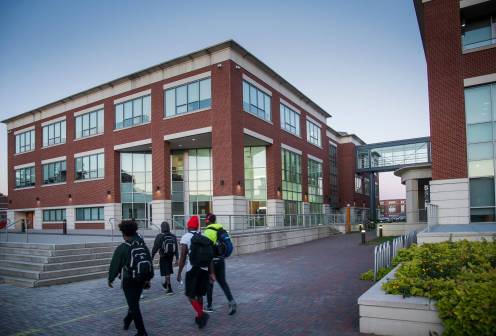‘Homework gap’ prompts K-12 teachers to skip some assignments

Although more students than ever have access to the internet through mobile devices, the “homework gap” — a divide between students who have home broadband internet access and students who do not — persists and continues to disadvantage lower-income students and students of color, according to results from a nationwide survey of teachers released Wednesday.
Produced by Common Sense Media, a nonprofit organization that promotes safe technology and media for children, the survey collected input from more than 1,000 K-12 teachers to discover some of the key issues perpetuating the homework gap with the goal of promoting critical changes to improve the success of all students.
“As long as the homework gap persists, teachers cannot prepare the students of today for the jobs of tomorrow,” James Steyer, CEO of Common Sense, said in a press release.
Mobile devices, while able to connect students to basic internet services, do not offer the same tools as internet-enabled computers, and as a result do not adequately bridge the homework gap for students, according to the survey.
There are 12 million children in the United States who live in homes without broadband access, according to Common Sense. And as schools increasingly assign online school work, these students need to find alternative ways to connect to the internet, such as free Wi-Fi at a Starbucks or library parking lot.
Forty percent of teachers surveyed said many of their students do not have adequate home access to the internet or a computer, but that such access — both in school and at home — is essential for academic success.
This puts teachers in a difficult spot. Many teachers aware of the homework gap report not assigning homework that requires high-speed internet access, ultimately limiting their students’ learning.
The homework gap does not equally affect all students. Low-income students and students of color are more likely to lack home access to the internet or a computer.
“When it comes to digital tools that will prepare the students of today for the jobs of tomorrow, we are short-changing lower-income students and students of color,” Steyer said in the press release. “State and federal policymakers must push for critical changes so all kids can succeed.”
The homework gap also presents school districts and policymakers with challenges. According to the report, there is often insufficient data to understand the gaps in connectivity and why they exist. A lack of broadband infrastructure in many rural areas, high service cost, limited customer service and poor service quality caused by a lack of competition in the broadband marketplace are among some challenges identified by the report.
“Today, homework and high-speed internet service go hand-in-hand. But as this report makes clear, too many students are struggling because they lack the broadband access they need to complete nightly schoolwork,” Federal Communications Commissioner Jessica Rosenworcel said in a press release. “This report is a welcome contribution to the effort to fix [the homework gap]. We need to make this a national imperative. Because if we want every student to have a fair shot at digital age success, we must ensure that no child is left offline.”




